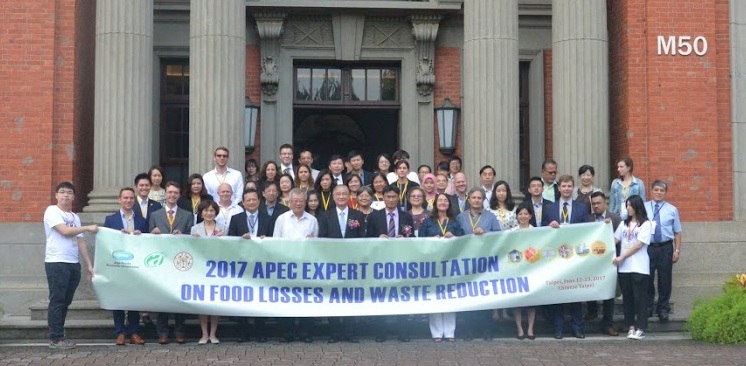News
Representatives of APEC members met in Taipei to discuss reducing food losses and waste
On the 12th and 13th of June of 2017, the Council of Agriculture (COA) held the “2017 APEC Expert Consultation on Food Losses and Waste Reduction” at National Taiwan University. About 60 representatives from 17 APEC member economies—including the US, Japan, P.R. China, Australia, Thailand, Vietnam, and Taiwan—met to discuss policies, innovative measures, and best practices to reduce losses and waste of food. The representatives worked together to set directions for cross-disciplinary cooperation and capacity-building with respect to promoting reduction of food losses and waste, with the goal of upholding and increasing APEC regional food security.
The COA points out that a report by the UN Food and Agriculture Agency indicates that every year about 1.3 billion metric tons of the world’s food supply (about 1/3) is lost or wasted. Moreover, according to a study by Taiwan, the APEC region every year loses or wastes about 26.7% of its food (670 million metric tons), of which losses account for 60% and waste for 40%. This lost or wasted food would be enough to meet the needs of the world’s population living below the poverty line (about 800 million people) for a year. Moreover, given the impact of global population increases, rising urbanization, climate change, and other factors, concerns are deepening that the supply of food will be insufficient or that there will be a food security crisis. In order to resolve the problem of food losses in the Asia-Pacific region, Taiwan in 2013 proposed a multi-year program to APEC entitled “Strengthening Public-Private Partnerships to Reduce Food Losses in the Supply Chain,” which became the first multi-year agricultural plan ever given financial support by APEC. It is hoped that through systematic exploration of the problems of losses and waste in the food supply chain with respect to grains, fruit and vegetables, and meat and fish, coping mechanisms can be devised, and a food loss database can be constructed, for use by the public and private sectors in all APEC member economies.
The COA says that Taiwan’s implementation of the “Strengthening Public-Private Partnership to Reduce Food Losses in the Supply Chain” multi-year program has entered the stage of comprehensive summing up, and the holding of the “2017 APEC Expert Consultation on Food Losses and Waste Reduction” in Taiwan was an important activity in this multi-year program. Besides using the Expert Consultation to cast a wide net in inviting public and private sector members from all countries and representatives of international organizations to share in the progress and successes of the program to reduce food losses and waste, even more it was hoped that persons in attendance would be able to develop a follow-up action plan for reducing food losses and waste in the Asia-Pacific region. Through coordination and participation by the public and private sectors in APEC members, we can achieve targets such as those in the “APEC Food Security Roadmap Towards 2020” and the United Nations “Millennium Development Goal” of eliminating poverty, and advance toward Asia-Pacific regional food security.
The COA emphasizes that, through promoting programs and activities related to reducing food losses and waste, Taiwan hopes to demonstrate and highlight its contribution to maintaining Asia-Pacific regional food security. This year’s (2017) APEC host, Vietnam, has already listed food security as one of the important issues on the agenda, and in August of this year Taiwan and Vietnam will jointly sponsor “2017 APEC Capacity Building Workshop on Food Losses and Waste Reduction for a Sustainable APEC Food System”. We hope that relevant high-level meetings and ministerial conferences can continue to place importance on this issue, and accept and adopt Taiwan’s multi-year program and various other suggestions to reduce food losses, so that together with all parties will promote concrete measures to uphold Asia-Pacific regional food security.

